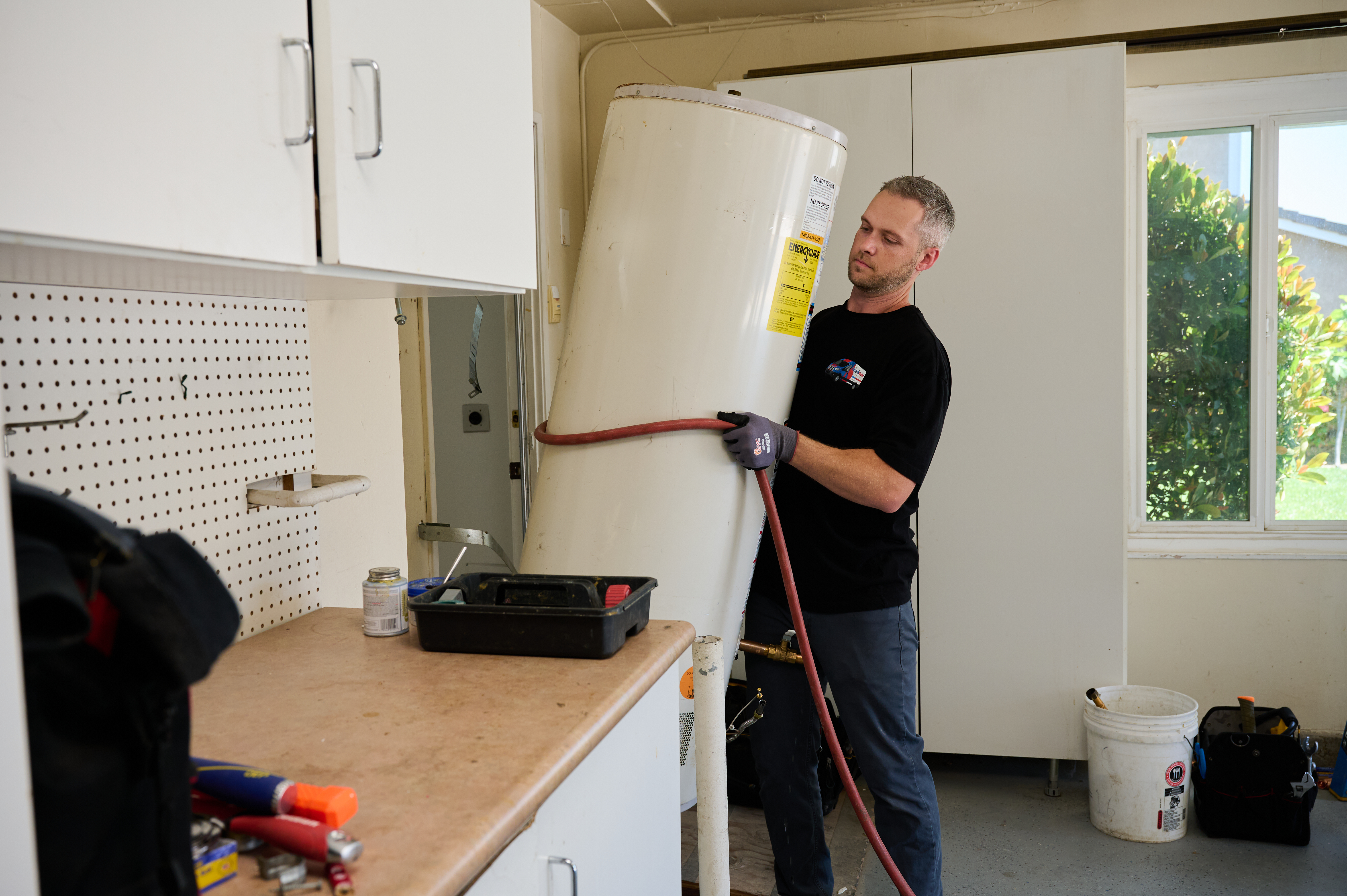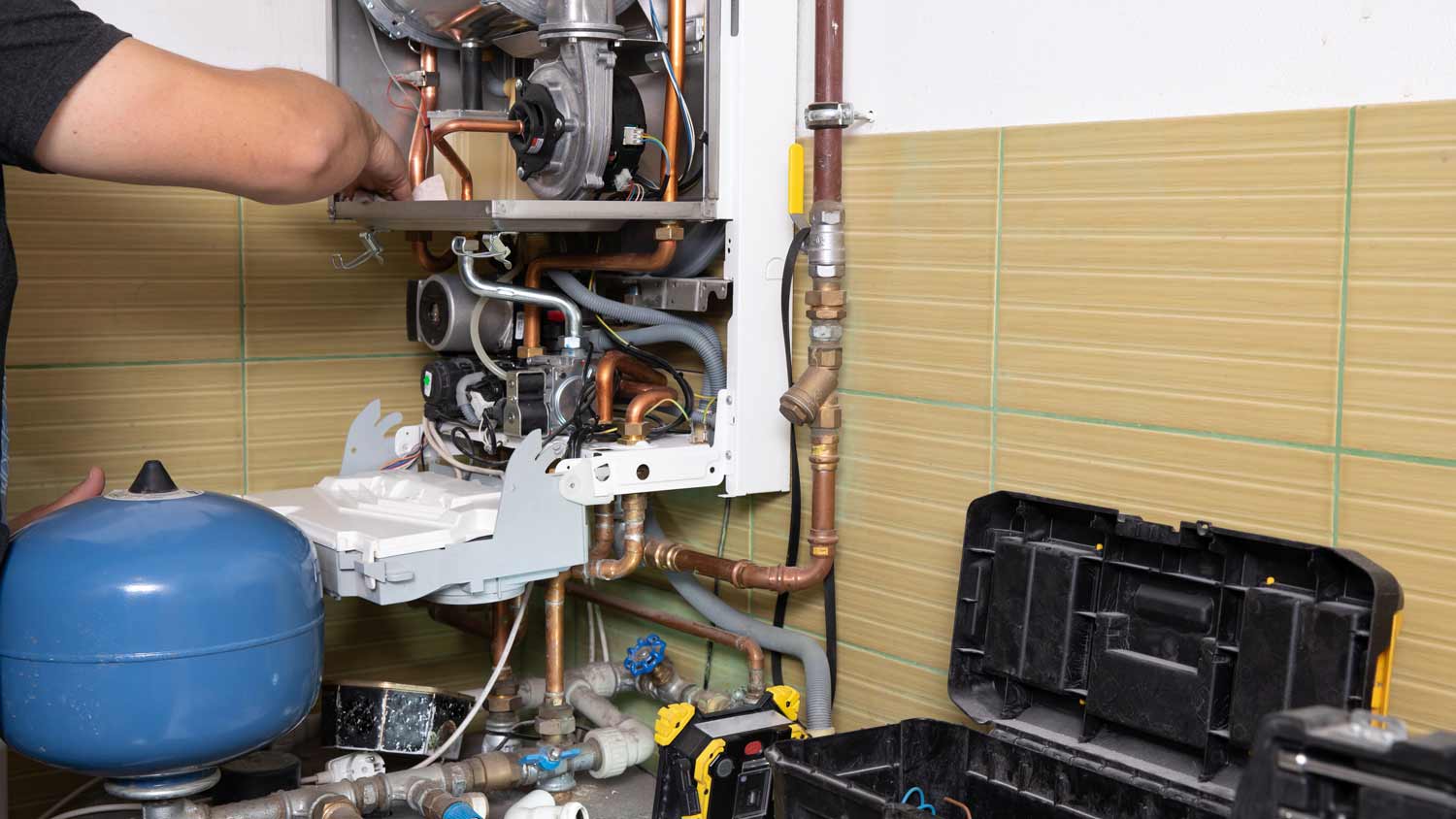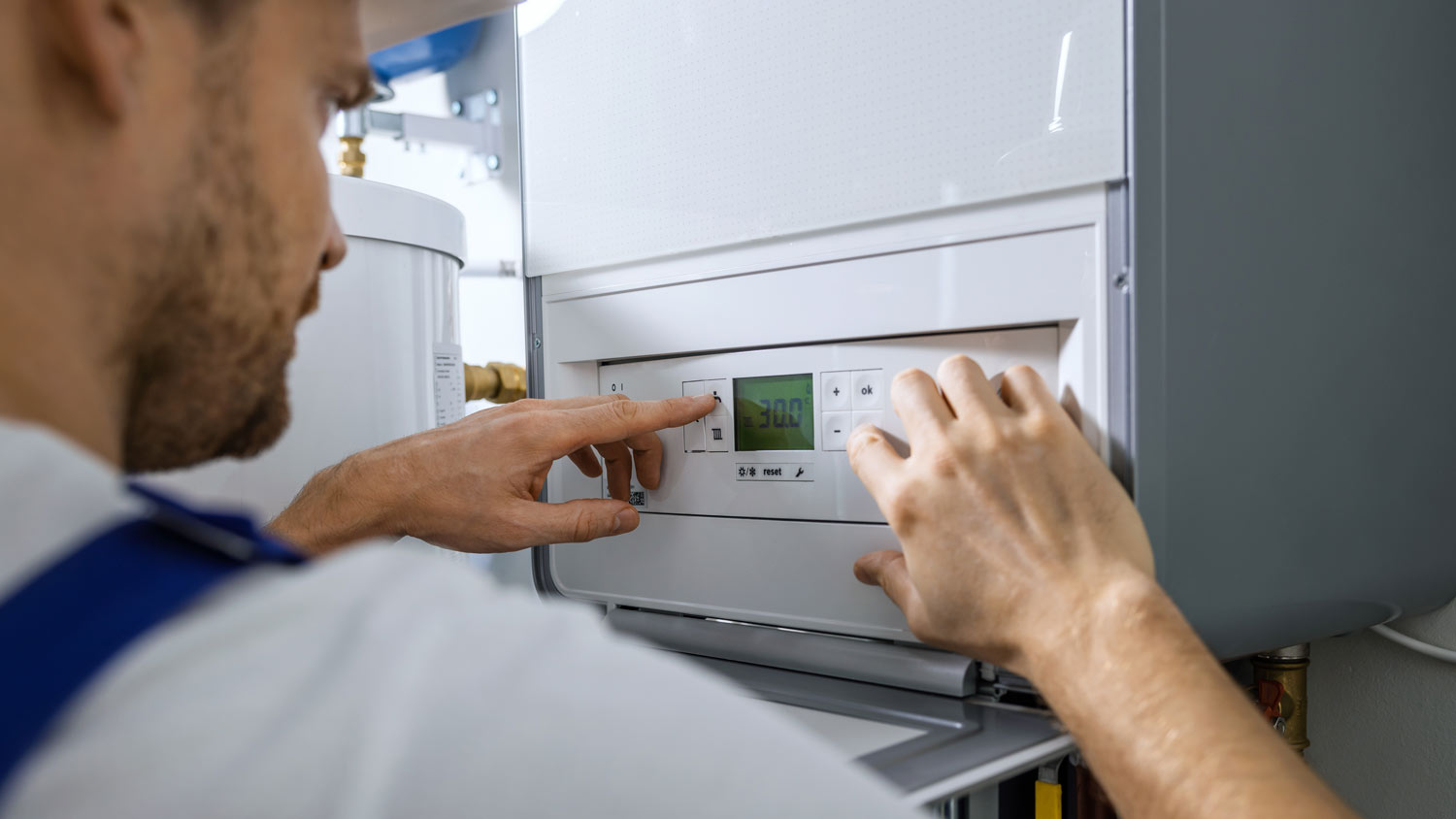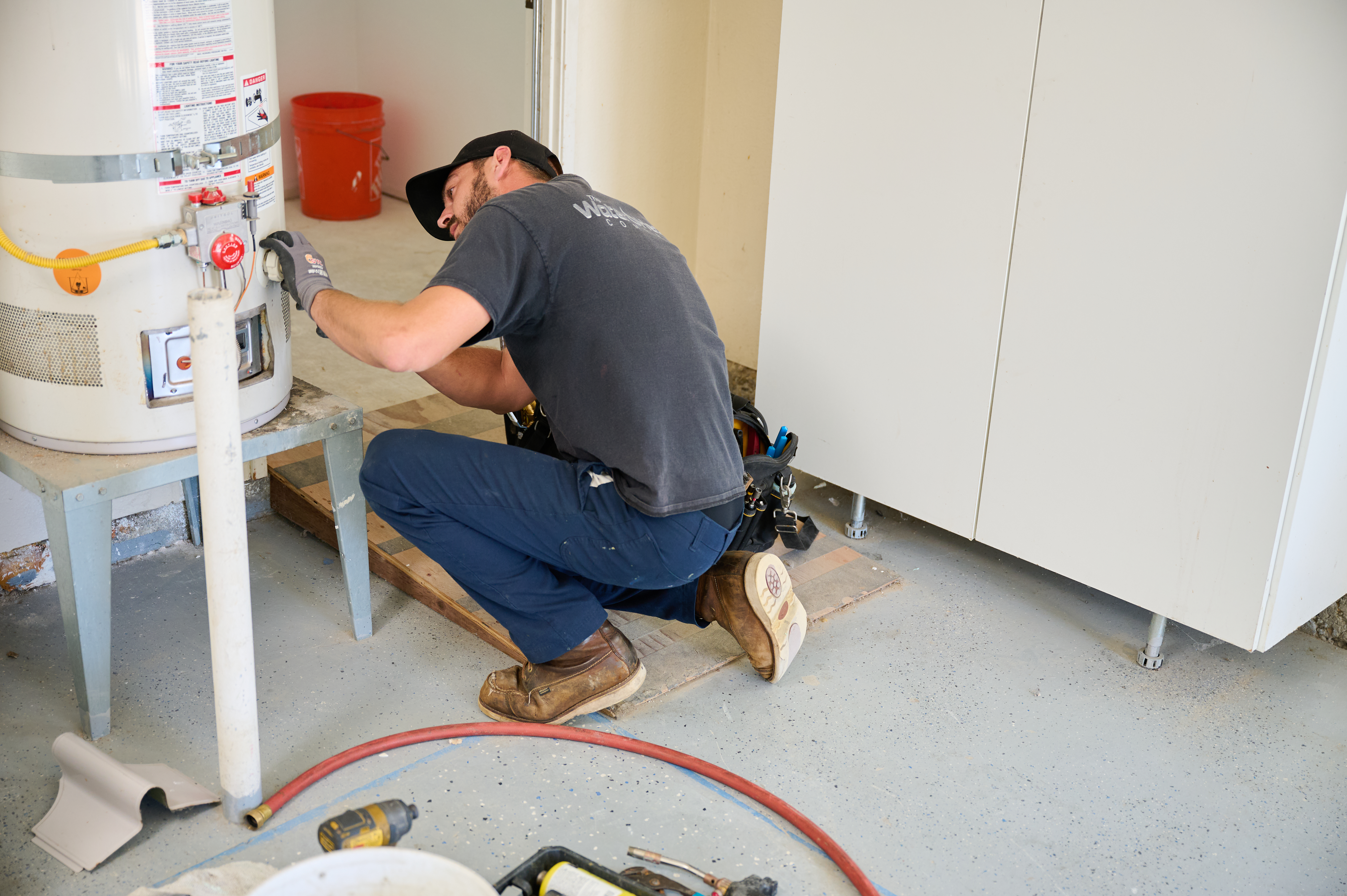
Looking to replace or upgrade your water heater? Use this water heater replacement cost guide to see what the work will cost and what factors affect your total.
Set your timetable instead of boiling over


Boilers provide efficient heat to homes and can even serve as a water heater. Whether you’re replacing an outdated boiler or adding a boiler-powered radiant heating system, you’re likely wondering how long it takes to install a boiler. Boilers are complex systems that require multiple changes when you choose a replacement model, so let’s review how long you can expect the installation to take.
A boiler installation can take anywhere from a single session lasting 4 to 6 hours to multiple visits over three to four days. For a more complicated boiler installation, boiler professionals will break the project up into multiple visits, such as one day for removing the old boiler and its tank, one for installing the new boiler and pipes, and one for checking the system, bleeding out the air, and starting it up.
The more similar the new model is to your old boiler system, the faster the installation will go, but you should expect most installation projects to take several days. The timeframe will also vary depending on the installer’s schedule.
To help you plan for your boiler installation, here are some of the most important factors affecting the timeline:
Upgrading to a larger model: A bigger boiler means a longer installation and often adjustments to pipes, venting, and other heating factors.
Adding a new boiler: Adding a new boiler is a much longer, more complex project than replacing one. Finding a space for the boiler and installing the piping system makes this one of the longest boiler projects.
Changing the boiler type: There are several different types of boilers, including those that offer both heating and hot water. Changing to a different type of boiler will add steps to the installation.
Relocating a boiler to a new position: Moving a boiler may be necessary when upgrading or changing a boiler type. Similar to installing a new boiler, this task requires extra work, which lengthens the project significantly.
Switching fuels: If you’re moving from electric to gas boiler systems, you’ll need new radiators and other components, too, which adds a lot of time to the project.
Replacing radiators or radiant heating pipes: If other parts of your boiler system also need to be replaced due to old age or incompatibility, the project becomes much larger, especially for whole-house heating.

Boilers last a long time, but their high-pressure nature means they tend to wear out over time. Here’s what to look for if you’re worried you need to replace your boiler:
Boiler is 15 to 20 years old: Boilers have a lifespan of 15 to 20 years. This is the timeframe when you should start planning a replacement.
Visible rust and degradation: If your boiler parts are starting to show rust or other serious signs of corrosion, you need a replacement model before it affects the system’s output quality.
Weird or loud noises: High-pressure tanks often emit strange noises as a warning sign of a larger issue. Unexpected banging or new thrumming signs could indicate it’s time for a boiler service inspection.
Unavailable parts for your boiler: If repair experts struggle to locate parts because they’re hard to find, that’s a sign that a new boiler should be in your future.
Heating takes too long: If your boiler is slow to heat water and your home doesn’t seem as warm, that’s a sign the system is running down. As your boiler works harder, you may also notice your energy bills starting to rise even when usage stays the same.
Scale in the boiler: Scale forms from hard water as it's heated. Without water softeners or other solutions, thick scale can build up, limiting how much water the boiler and its pipes can hold.
Frozen boiler: If a cold night froze your boiler and broke multiple valves and pipes, it may be less expensive to get a new boiler than pay for the repair costs.

If you’re replacing your boiler, it’s the perfect time to practice top-notch maintenance habits to keep it healthy. Practice these important steps to extend its lifespan:
Keep it clean and clear: Give your boiler a couple of feet on every side and keep items away from it. Make sure any drains, combustion vents, and other openings are clear.
Keep an eye on water levels: Modern boilers don’t run out of water very quickly, but water levels can decrease over time.
Insulate pipes: Insulate the pipes if the boiler is in an area that’s exposed to very cold temperatures during the winter to prevent freezing.
Use a filter on open-vent systems: If you have an open-vent boiler, make sure it has a magnetic filter to remove debris that the water picks up as it circulates through the pipes.
Treat hard water with water softeners: Don’t let hard water create scale in your boiler. If you have hard water in your area, make sure your boiler has a water softener, inhibitor, or other component to eliminate scale problems.
Check temperature and pressure: Know the proper ranges for temperature and pressure on your boiler, and check them occasionally, especially if your boiler is acting strangely. If the gauges should that temperature or pressure are exceeding proper limits, shut the boiler down and hire a service professional.
Bleed the boiler before turning it on for the season: Trapped air can accumulate in boilers, especially when they aren’t in use. Boilers can naturally release trapped air, but if it’s been a while, use the bleed valve to release air manually.
Schedule annual service: Boilers benefit greatly from regular professional boiler maintenance. Plan inspections ahead of seasonal use or once every year or two.
Plan an occasional full flush: A full boiler flush shouldn’t be a regular maintenance step, but it’s a good idea to schedule one every several years, especially if sludge tends to slowly build up in your boiler.
From average costs to expert advice, get all the answers you need to get your job done.

Looking to replace or upgrade your water heater? Use this water heater replacement cost guide to see what the work will cost and what factors affect your total.

Tankless water heater costs in Columbus, OH depend on the size of your water heater, location, fuel type, and more. Keep reading to calculate your expenses.

Find out the average tankless water heater repair cost, what impacts pricing, and how to save. Get expert tips to plan your repair budget with confidence.

Testing a water heater thermostat starts with shutting off the power and using a multimeter. Follow this guide on how to test your water heater thermostat.

Help your water heater work correctly and efficiently with a water heater inspection. We’ve got you covered with a checklist that you can do yourself.

Learning how to change the temperature on your water heater takes just a few minutes and the help of a screwdriver. Find out how easy it really is in this guide.